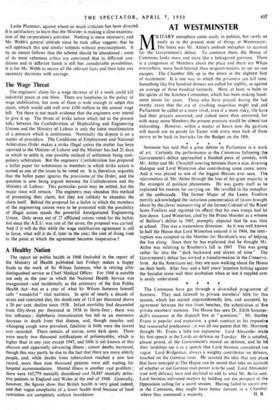AT WESTMINSTER
MILITARY metaphors come easily in politics, but rarely so easily as in the present state of things at Weitminster. The latest was Mr. Attlee's ambush metaphor to account for the Government's defeat. To continue them, the House of Commons looks more and more like a beleagured garrison. There is a Congestion of Members about the place and there are Whips everywhere, more hard-hearted than sergeant-majors, to see no one escapes. The Chamber fills up to the doors at the slightest hint of excitement. It is one way in which the prisoners can kill time. Something like five hundred dinners are called for nightly, as against an average of three. hundred formerly. Here, at least, is balm to the spirits of the Kitchen Committee, which has been making hand- some losses for years. Those who have prayed during the last twenty years that the era of crushing majorities might end and Parliament be called to a more vivid, even if a more risky, life have had their prayers answered, and indeed more than answered, for with many more Members the present pressure would be almost too exhausting. However, within a matter of hours now the garrison will march out on parole for Easter with every man Jack of then' sworn to be back in barracks for the Budget on the 18th.
Someone has said that a great debate in Parliament is a work of art. Certainly the performance in the Commons following the Government's defeat approached a finished piece of comedy, with Mr. Attlee and Mr. Churchill weaving between them a nice, diverting dialogue and Lord Winterton also contributing some comic notes. And it was played to one of the biggest Houses ever seen. The rejuvenation of Mr. Attlee through the loss of his great majority is the strangest of political phenomena He was gaiety itself as he explained his reasons for carrying on. He revelled in the metaphor of the ambuscade. The former Major of the Lancs. Fusiliers merrily acknowledged the victorious concentration of forces brought about by the clever manoeuvring of the former Colonel of the Royal Scots Fusiliers and regretted (in effect) that his own troops had let him down. Lord Winterton, cited by the Prime Minister as a witness of Balfour's defeat in 1905, promptly objected that he was then at school. This was a tremendous diversion. As it was well known to half the House that Lord Winterton entered it in 1904, the inter- ruption was accepted as the Member for Horsham's way of helping the fun along. Since then he has explained that he thought Mr. Attlee was referring to Rosebery's fall in 1895 This was going rather far into the "dark backward and abysm of time." The Government's defeat has worked a transformation in the Conserva- tives. As the Americans say, they are now walking about the House on their heels. After four and a half years' hopeless butting against the Socialist stone wall their exultation when at last it toppled over is easily understood. * * * * The Commons have got through a diversified programme of business. They said farewell to private members' bills for this session, which has started unprecedentedly late, and accepted, by agreement between the two front benches, the substitution of five private members' motions. The House has seen Dr. Edith Summer- skill's successor at the dispatch box at "questions." Mr. Stanley Evans is popular and expansive, a great contrast to his impassive but resourceful predecessor; it was all too patent that Mr. Morrison thought Mr. Evans a little too expansive. Lord Alexander made his first speech in the Lords on defence on Tuesday. He is satisfied, almost proud, of the Government's record on defence, and he let their lordships see it in a speech that Lord Swinton considered too vague. Lord Bridgeman, always a weighty contributor on defence, touched on the German issue. He scouted the idea that any plane that have emerged at The Hague can be sound that take no account of whether or not German man-power is to be used. Lord Alexander trod with delicacy here and declined to add to what Mr. Bevin said. Lord Swinton enlivened matters by holding out the prospect of the Opposition calling for a secret session. Having failed to secure one in the Commons, they might have better fortune in a Chamber






































 Previous page
Previous page